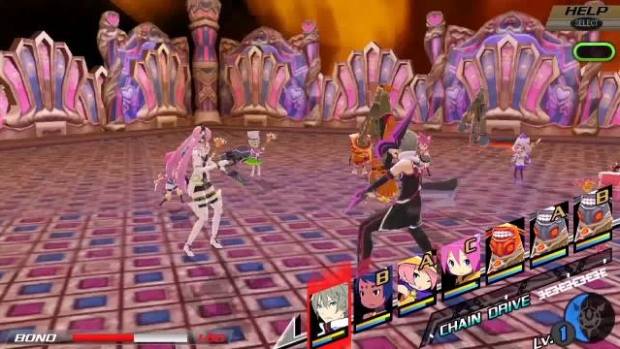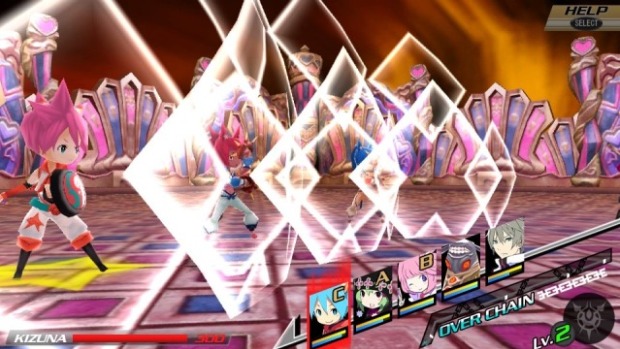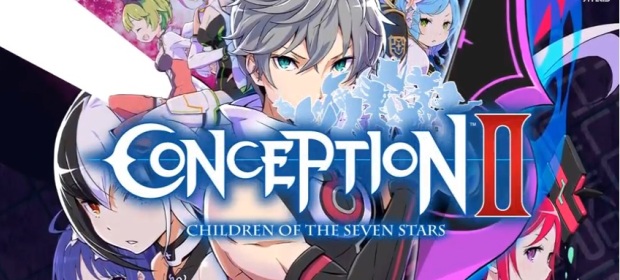Birds do it. Bees do it. Even educated fleas do it. Let’s do it. Let’s mate and make beautiful Star Children together, so we can fight demons. Big, bloody demons.
Conception is just so damn weird. Starting you off as boy at an academic establishment that tries to keep demonic hordes from destroying the world (so far, so Persona), it is from then on you make social bonds with your classmates (so far, so Persona once more), which in turn, allows you to mate with them, spawning party members that you use in combat (so far, so “what the f*@k is going on?”). Yes, you see, Conception is about procreating with as many women as possible, or, as the game refers to it: “Class-mating”. You got it, it’s pretty much a dating game, complete with more rampant sexism and objectification than you can throw a huge, wobbly bosom at. I could waste this review criticising the entire Japanese culture for this stuff, but needless to say, if you’ve bought a Japanese dating sim, you know what you’re getting yourself into and you probably didn’t come just for the free food.
The meat of Conception II is battling through various dungeons, known as Labyrinths, plus a few sub-Labyrinths in which you can find better equipment and level up your party. Consisting of several floors, as you reach the higher levels, you’re occasionally able to leave the area to save your game, buy new equipment, make more babies, etc. You can then re-enter the Labyrinths from these exit points and carry on your progress.

It’s unfortunate that these areas have very little to differentiate themselves, other than a different repeated paint job in each one. There is a definite feeling of repetition as you tackle Labyrinth upon Labyrinth, eventually fighting (and hopefully) defeating the big boss of each one, before progressing through the story and eventually accessing the next Labyrinth.
In-between these excursions, you’ll be socialising with the students and faculty at the Academy, saying nice things and giving presents to the ladies so they’ll give birth to more powerful offspring, with different classes available. With three customisable teams available in combat at once, there’s a great number of combinations available to you, and part of the fun is seeing which Star Children work best for you. You’re also able to take one of your female colleagues with you, who also have their own abilities.
The combat is also sort of interesting, with turn-based battles introducing a mechanic where you can attack enemies from the front, left, right and rear, with different locations causing more damage via a weak point. A chain meter will also fill to varying amounts after each attack, eventually allowing combos that give you more Exp and GP. There’s a little depth to the combat, but once again it eventually gets a bit samey.

This repetition is Conception II’s biggest problem. The constant cycle of going to a Labyrinth, going back to the Academy, rinsing and repeating, becomes incredibly yawnsome. Even the social aspects lack any sort of depth, as the characters themselves only exist to give birth, which you’ll spend most of the game trying to make them do. Their interactions are immature, and the risque nature of the conceptions themselves (multi-coloured silhouettes of the teenage student writhing around, which are mercifully skippable) just means that the game as a whole is a rather hollow experience, with the narrative never hitting any sort of gravitas.
All of these negatives overshadow a game that has some solid JRPG mechanics as a base. It’s just that the way these mechanics are tied together is so incredibly repetitious, soulless and immature. Everything just feels like a skeleton with so very little flesh on the bones, feeling quite Persona-lite in places, but with none of the character that the superior series is so beloved for.
VERDICT: Putting aside it’s controversial nature, Conception II is okay as a JRPG. If you can handle the identikit dungeons and by-the-numbers gameplay (and if you haven’t played the many other great JRPGs on both 3DS & Vita), then you may find some enjoyment here, but it’s unlikely to last very long.

DECENT. A 6/10 indicates that, while this game could be much better, it still has a fair amount to offer the player. It might be an interesting title sabotaged by its own ambition, or a game denied greater praise by some questionable design choices. Don’t avoid it outright, but approach it with caution.
Review code provided by publisher.






